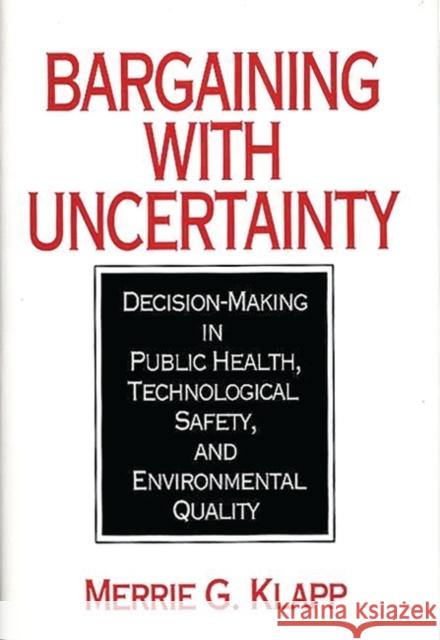Bargaining with Uncertainty: Decision-Making in Public Health, Technologial Safety, and Environmental Quality » książka
Bargaining with Uncertainty: Decision-Making in Public Health, Technologial Safety, and Environmental Quality
ISBN-13: 9780865690462 / Angielski / Twarda / 1992 / 168 str.
Bargaining with Uncertainty: Decision-Making in Public Health, Technologial Safety, and Environmental Quality
ISBN-13: 9780865690462 / Angielski / Twarda / 1992 / 168 str.
(netto: 270,05 VAT: 5%)
Najniższa cena z 30 dni: 280,09
ok. 30 dni roboczych.
Darmowa dostawa!
In this intriguing volume, Merrie G. Klapp explains how regulatory decisions in such crucial areas as public health, technological safety, and environmental quality are molded and recast. She finds that scientific uncertainty is a key factor, with agencies, interest groups, Congress, and the courts attempting to shift responsibility of proof or varying the standard of proof according to the pressures brought to bear on the issue. In general, Professor Klapp finds that when citizens or industrialists organize to protest a regulatory decision and when the legislature or the courts take scientific uncertainty into account, then the initial regulatory decision is changed.
By contrast with the United States, where scientific uncertainty is used as a public resource and rationale for change, in France and Britain scientific uncertainty is treated as a private resource. French and British scientists do not treat regulatory decisions as opportunities to reveal scientific uncertainty to the public--instead, discussions of uncertainties are held behind closed doors and, when reports are made to the public about regulatory decisions, scientific information is presented as if it were certain. Bargaining with Uncertainty will be a provocative analysis to those scholars and researchers concerned with the making of public policy as well as those concerned with risk assessment in public health, the environment, and technology.











